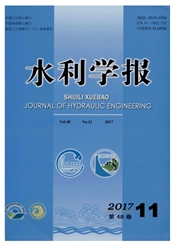

 中文摘要:
中文摘要:
越来越多的岩土工程涉及到土体的抗拉强度问题,如土石坝心墙裂缝、地面开裂、水力劈裂等都是土体拉伸破坏的表现形式。为研究非饱和土的抗拉强度特性,对平卧式土体抗拉强度试验装置中侧壁倾角的设计值进行了理论推导,基于此分析对传统的土体抗拉强度试验装置进行了改进,并以非饱和细砂为研究对象,运用等速率单轴拉伸方法开展了不同干密度和含水率条件下的非饱和土抗拉强度试验研究,探讨了土体抗拉强度随干密度和含水率的变化规律,结果表明:非饱和细砂的抗拉强度随干密度的增大而增大,随含水率变化呈现“增-减-增”变化规律。
 英文摘要:
英文摘要:
Tensile strength of soil plays an important role in controlling the cracking and tensile failure of many earth structures, such as core wall of earth-rock dam cracking, ground fracturing and hydraulic frac- ture. In order to study the tensile strength of unsaturated soils, the design value is derived for determining the inclination angle of inner sidewall of the specimen molds. Then an improved direct tensile test appara- tus based on constant strain rate controlling method is developed to determine the tensile strength of fine sands over a broad range of water contents and with different dry densities. The results show that the ten- sile strength of fine sands significantly depends on dry density and water content. The tensile strength in- creases with the increase of dry density, and shows an "increase-decrease-increase" pattern with the in- crease of water content.
 同期刊论文项目
同期刊论文项目
 同项目期刊论文
同项目期刊论文
 期刊信息
期刊信息
